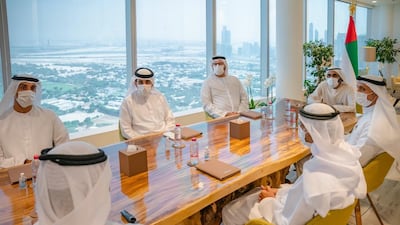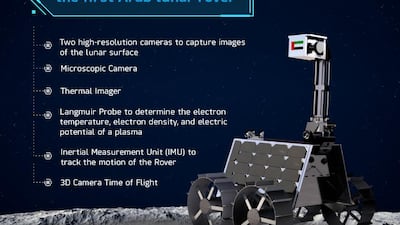The UAE Moon mission has the power to “inspire the country and stimulate the economy”, Europe’s space chief said in Davos on Wednesday.
The UAE will attempt to land a rover on the celestial body in October in what will be the Arab world’s first mission to the Moon.
“Going to the Moon is a big step. But it has many aspects. One is, it unites a country. It inspires the people. It stimulates the economy and the industry that is producing the technology to do that,” said European Space Agency Director General Josef Aschbacher.
“And of course, people will be very proud when the moment happens. And I think this is something quite exciting,” he said.
The ESA is a long-time supporter of the UAE’s space ambitions and helped it train its first astronaut, Hazza Al Mansouri.
Last year, the Mohammed Bin Rashid Space Centre and the ESA agreed to work on the establishment of a long-term collaboration.
Space travel a symbol of UAE progress
“The UAE is a very innovative country and is really driving technology and wants to be at the forefront,” said Mr Aschbacher.
“And space, of course, [this] is the symbol for exactly that. On our side, I see huge opportunities to really work together.
Mr Aschbacher spoke of a recent conversation he had at Davos with Sarah Al Amiri, Minister of State for Public Education and Future Technology and chairwoman of the UAE Space Agency.
“And after the formal panel session, we spoke and she said, ‘Look, I really would like to intensify this co-operation even further, because we would like to work more with Europe’,” he said.
“So, the European Space Agency and myself, I'm also very interested to work more and deeper with the UAE because it's … a new space country, with a lot of excellence. And I would be more than happy to deepen this co-operation.”
Agency focus on sustainability
The ESA is also working on sustainability in space, particularly where space junk and satellites are concerned.
While sustainability efforts are currently focused among EU member states, there will be a need to bring in more countries, said Mr Aschbacher.
“It's a big topic for us. So, I would like to propagate a sustainable use of our orbits or of space out there,” he added.
“And there's one initiative I am now starting with my member states is that we want to create a zero-debris policy in orbit, meaning that if you put a satellite up there, you have to get the satellite out in order to not pollute or not to overcrowd these orbits because they are finite in terms of, of dimensions.
“Policies in this direction are not yet decided. But that's certainly something I'm striving towards in order to have sustainability applied not only on the ground for climate change, but also up in space.”
The war in Ukraine has disrupted some of the ESA’s plans and projects as it is no longer working with Russia, a major space power.
“This is my day job at the moment, to make sure that untangling the co-operation with Russia is going according to plan,” he said.
“It will make us stronger, because we will be more independent and therefore building up our own capabilities.
“I'm very confident [this will take] maybe two or three years or so to build up this independence. But we will come out of this crisis stronger than before.”
The Europeans are also playing a key role in Nasa’s Artemis manned programme to explore the Moon.
“We are part of the SLS rocket. There is one very important element called the ‘European Service Module’, which is powering the Orion space capsule,” he said.
“And without that, the Moon mission cannot take place. You actually see it also on the rocket … there’s a national logo. There's also the ESA logo, which is proof to our strong co-operation.
“Therefore Nasa does rely on us, and I'm very proud of that and I'm very happy about that.”











